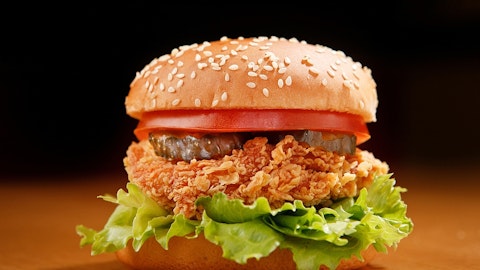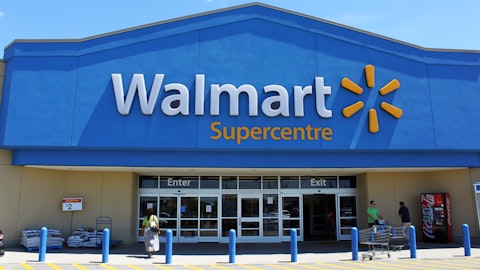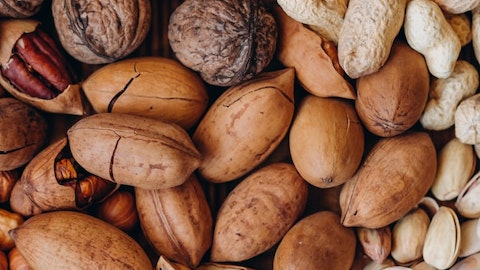John B. Sanfilippo & Son, Inc. (NASDAQ:JBSS) Q2 2024 Earnings Call Transcript February 1, 2024
John B. Sanfilippo & Son, Inc. isn’t one of the 30 most popular stocks among hedge funds at the end of the third quarter (see the details here).
Operator: Good day, and thank you for standing by. Welcome to the John B. Sanfilippo & Son Second Quarter Fiscal 2024 Operating Results Conference Call. At this time, all participants are in a listen-only mode. After the speakers’ presentation, there will be a question-and-answer session. [Operator Instructions] Please be advised that today’s conference is being recorded. I would now like to hand the conference over to your first speaker today, Jeffrey Sanfilippo, CEO. Please go ahead.
Jeffrey Sanfilippo: Thank you, Victor. Good morning, everyone, and welcome to our 2024 second quarter earnings conference call. Thank you for joining us. On the call with me today is Frank Pellegrino, our CFO. We may make some forward-looking statements today. These statements are based on our current expectations and they involve certain risks and uncertainties. The factors that could negatively impact results are explained in the various SEC filings that we have made, including Forms 10-K and 10-Q. We encourage you to refer to the filings to learn more about these risks and uncertainties that are inherent in our business. Starting with overall corporate performance, we delivered a record second quarter net sales of $291 million.
This beats the previous Q2 sales record of $279 million in fiscal 2016. In addition, we delivered a very strong 13.1% increase in diluted earnings per share, which includes the dilutive impact of the Lakeville acquisition. This was a significant quarter for our company, as it represents the first quarter of financial results that includes our recent Lakeville acquisition. The Lakeville business increased our quarterly sales volume by 11.6 million pounds or 14.4% over the second quarter of fiscal ’23, and increased quarterly net sales by approximately $28.7 million or 10.5% over the second quarter of fiscal ’23. We also sold approximately $1.9 million of our own internally-developed nutrition bars, which compliments the snack bars produced in Lakeville.
Furthermore, at the beginning of December, we completed key integration steps for the Lakeville acquisition and have begun optimizing the facility’s operations. We’re in a great position to grow our business in the Lakeville plant and we’ve our first major customers visiting the manufacturing facility in the coming months. This time last year, I mentioned that JBSS was excited to enter the $8 billion snack bar category across omnichannel. The white space in the category is high-quality retailer brand offerings, and now, JBSS is positioned to become a partner of choice in the nutrition and snack bars section for private brands given our strong track record of quality, service, and integration. I would like to personally thank each member of the integration team for all their hard work, personal sacrifices, and dedication to successfully complete the Lakeville transition in less than three months.
I am so proud of the leaders we have here at JBSS. The company has proven it can integrate businesses into our portfolio as we build bench strength for future M&A. And, we’re confident we will see value creation from this latest acquisition as we execute our growth strategies to further diversify our capabilities and product portfolio. The management team is focused on executing the company’s long-term strategic plan for growth to become a $2 billion business. This quarter, I want to highlight our commercial ingredient channel. While the channel only represents approximately 11% of our net sales, the foodservice component is an important focus for growth. Our team continues to advance strategic partnerships across distributors and key non-commercial operators.
These partnerships serve to mitigate supply risks and support sustained growth over time. Non-commercial has been a key catalyst for both back of house ingredient sales and foodservice branded retail growth. Since the beginning of fiscal ’23, non-commercial has provided 2.4 million pounds of growth and JBSS branded items, including Fisher and Orchard Valley Harvest snacks, have been placed in over 40,000 new points of distribution, which include micro markets, vending, and foodservice retail outlets. We see the non-commercial space continuing as a strategic growth area for the company. We’re executing our growth strategies by investing in our people and our culture. We’re being intentional in diversifying our workforce and creating a robust and inclusive leadership team across the organization.
We’re being intentional in improving our impact on the environment and being good stewards in the communities where we live and work. I’m proud of the hard work and progress our corporate responsibility team is making to define a framework for our goals and execute initiatives. We are living our mission to create real food that brings joy, nourishes people, and protects the planet. I will now turn the call over to Frank Pellegrino, our CFO, to provide additional information on our financial performance for our second fiscal quarter.
Frank Pellegrino: Thank you, Jeffrey. Starting with the income statement, net sales for second quarter of fiscal 2024 increased 6.2% to $291.2 million compared to net sales of $274.3 million for the second quarter of fiscal 2023. Net sales for second quarter of fiscal 2024 include approximately $28.7 million of net sales from the Lakeville acquisition. Excluding the Lakeville acquisition, net sales decreased $11.8 million or 4.3%. The decrease in net sales was due to a 1.7% decrease in the weighted average sales price per pound, combined with a 2.6% decrease in sales volume, which is defined as pounds sold to customers. Sales volume for peanuts and all major tree nuts declined in the current second quarter. The decrease in the weighted average selling price primarily resulted from lower commodity acquisition costs for most major tree nuts, which was partially offset by higher commodity acquisition costs for peanuts.
Sales volume increased 15.3% in the consumer distribution channel, primarily due to the Lakeville acquisition, whose sales volume is almost exclusively private brand bars. Excluding the impact of the Lakeville acquisition, sales volume decreased 2.8% in the consumer distribution channel, primarily due to 10.5% decrease in sales volume for our branded products, which includes Fisher recipe nuts, Fisher snack nuts, Orchard Valley Harvest and Southern Style Nuts. The sales volume decrease for our branded products was mainly attributable to a 12.6% decrease in sales volume for Fisher recipe nuts due to soft consumer demand across mass merchandising and grocery retailers and less merchandising activity at several grocery retailers. Sales volume for Southern Style Nuts decreased 36.7% due to reduced distribution and promotional programs at a club store customer.
The above branded decreases were partially offset by a 15.5% increase in sales volume for Orchard Valley Harvest, which is mainly due to increased distribution at a major customer in the non-food sector. Private brand sales volume in the consumer distribution channel increased by 20.2% due to the Lakeville acquisition. Excluding the Lakeville acquisition, there was a 2.3% decrease in private brand sales, again due to soft consumer demand at a mass merchandising retailer along with fewer seasonal items at another mass merchandising retailer. These decreases were partially offset by increased distribution of seasonal items at a grocery retailer. Sales volume increased 6.5% in the commercial ingredients channel due to a one-time sale associated with the Lakeville acquisition.
Excluding the Lakeville acquisition, sales volume increased 2.8% due to increased peanut butter sales to several existing foodservice and industrial customers. This increase was partially offset by decreased volume at a foodservice distributor due to competitive pricing pressures. Sales volume decreased 8.6% in the contract packaging distribution channel, primarily due to fewer seasonal items, reduced promotional activity at a major customer, and an item discontinuance at another customer. Second quarter gross profit margin as a percentage of net sales decreased to 19.9% compared to 20.6% for the second quarter of fiscal 2023. The decrease in gross profit margin was mainly due to the Lakeville acquisition, which negatively impacted gross profit by approximately 3.3% or $2.9 million, of which $1.2 million were one-time expenses.
Excluding the Lakeville acquisition, gross profit margin increased by approximately 260 basis points, mainly due to lower commodity acquisition costs for most major tree nuts, increased manufacturing efficiencies, improved product mix, and reduced non-compliant inventory. Gross profit increased $1.4 million or 2.5%, mainly due to higher net sales base. Excluding the Lakeville acquisition, gross profit increased approximately $4.3 million or 7.7% due to the same reasons cited for the gross profit margin increase. Total operating expenses for the second — for the current second quarter decreased $1.7 million in the quarterly comparison, mainly due to a one-time $2.2 million bargain purchase gain associated with the Lakeville acquisition. This decrease was partially offset by approximately $1.2 million in operating expenses associated with the Lakeville acquisition, of which $600,000 were one-time expenses.
Excluding the Lakeville acquisition, total operating expenses decreased $700,000, mainly due to decreases in freight and advertising spend, which was partially offset by increases in incentive compensation, charitable food donations, and insurance expense. Total operating expenses for the current second quarter decreased to 10.4% of net sales from 11.7% for last year’s second quarter, due to the reasons noted above and a higher net sales base due to the Lakeville acquisition. Excluding the impact of the Lakeville acquisition, total operating expenses as a percentage of net sales increased slightly to 11.9% from 11.7%. Interest expense for the current second quarter increased to $1.1 million from $600,000 for the second quarter of fiscal 2023, primarily due to the higher average debt levels due to the Lakeville acquisition and higher weighted average interest rates.

Net income for the second quarter of fiscal 2024 was $19.2 million or $1.64 per diluted share compared to $16.9 million or $1.45 per diluted share for the second quarter of fiscal 2023. Now, taking a look at inventory. The total value of inventories on hand at the end of the current second quarter increased $24.3 million or 14% compared to the total value of inventories on hand at the end of the second quarter of fiscal 2023. The increase was mainly due to the $36.2 million of inventory associated with the Lakeville acquisition. Excluding the Lakeville acquisition, the value of total inventories on hand decreased $12 million or 6.9% year-over-year. The decrease in value of inventories was primarily due to lower quantities of work in process, raw materials and lower on-hand quantities, and lower commodity acquisition costs for almonds and cashews, partially offset by higher quantities of pecans and walnuts and higher commodity acquisition costs for penuts and walnuts.
Excluding the impact of the Lakeville acquisition, the weighted average cost per pound of raw nut and dried fruit input stock on hand at the end of the current quarter decreased 9.8% compared to weighted average cost per pound at the end of the second quarter of fiscal 2023 and was mainly due to the reasons mentioned previously. Moving on to year-to-date results. Net sales for the first two quarters of the current year decreased by 0.3% to $525.3 million compared to the first two quarters of fiscal 2023. Excluding the impact of the Lakeville acquisition, net sales decreased 5.7% to $496.6 million. The decrease in net sales, excluding Lakeville, was primarily attributable to a 4.9% decline in sales volume and a 0.8% decrease in the weighted average selling price per pound.
Sales volume increased 2.3%. Excluding the impact of the Lakeville acquisition, sales volume decreased 4.9%, primarily due to sales volume decreases in the consumer and contract packaging channels. Gross profit margin increased 1.6% to 21.9% of net sales. The increase in gross profit margin was mainly attributable to lower commodity acquisition costs for all major tree nut commodities, except peanuts, and was partially offset by the impact of the Lakeville acquisition, as noted previously. Total operating expenses for the current year-to-date period increased $2.5 million to $62.8 million. The increase in total operating expenses was mainly due to increases in advertising expense, incremental operating expenses associated with the Lakeville acquisition, and charitable food donations.
These increases were offset by the one-time bargain purchase gain previously cited and a decrease in freight expense. Net income for the first two quarters of fiscal 2024 was $36.8 million or $3.15 per diluted share compared to net income of $32.5 million or $2.79 per diluted share for the first two quarters of fiscal 2023. Please refer to our 10-Q, which will be filed later today, for additional details regarding our financial performance for the second quarter of fiscal 2024. Now, I will turn the call back over to Jeffrey to provide additional comments on our operating results for second quarter fiscal 2024 and discuss category trends.
Jeffrey Sanfilippo: Thanks, Frank, for the financial updates. We continue to navigate a challenging operating environment, characterized by elevated retail sale selling prices and cautious consumers. I’ll take some time now to give you category and brand results for the first — for the second quarter. As always, the market information I’ll be referring to is Circana-reported data, and for today it is for the period ending December 31, 2023. When I refer to Q2, I’m referring to 13 weeks in the quarter ending December 31, ’23. References to changes in volume or price are versus the corresponding period one year ago. We look at the category on Circana’s total U.S. definition, which includes food, drug, mass, Walmart, military, and other outlets.
Unless otherwise specified and when we discuss pricing, we are referring to average price per pound. Breakouts of recipe, snack, and produce are based on our custom definitions developed in conjunction with Circana, and the term velocity refers to the sales per point of distribution. In the latest quarter, we saw — continued to see a shift in consumer behavior, not just in the nut and trail categories, but in the broader snack aisle as defined by Circana. We’re seeing volume declines no longer offset by prices across the entire snack aisle as consumers tighten their budgets in response to stubbornly high food prices. COVID-era SNAP and student loan benefits ending and future economic uncertainty is impacting consumer behavior. The snack aisle declined 3.6% in volume and was relatively flat in dollars in Q2.
This is down from a 2.3% volume decline and a 3% dollar growth rate in Q1. The total nut and trail mix category was down 4.4% in dollars and down 4.8% in pound volume in Q2. This is a decline versus what we saw last quarter. Overall, price increases across the category have moderated with price per pound flat versus the prior year. While prices have stabilized, the price per pound is still close to a five-year high. Now, I will cover each segment in more depth, starting with recipe nuts. Recipe nuts were down 7.5% in dollar sales and down 2.6% in pound sales. This is a decline in performance versus what we saw in Q1. During the holiday season, we saw consumers choose either smaller entry pack sizes or very large value pack sizes. This is a common shift we are seeing as consumers look to stretch their dollars even during holiday meal planning.
Prices of recipe nuts were down 5% versus last year, driven by walnuts and pecans. Our Fisher brand declined in Q2 after almost two years of consistent growth as we lost promotional programs and promotional space at a major grocery customer and a major mass customer. Fisher declined 13% in dollars and 14% in pounds. The brand still is the nut — brand recipe nut leader and we’re actively working on ways to engage consumers with the right price pack architecture and promotions. Now, I will turn to the snack category. In Q2, snack nuts were down 3% in dollar sales and down 4% in pounds. This is consistent with the performance we saw in Q1. Pricing continues to stabilize in the snack nut category with prices relatively flat. Fisher snack performed worse in the category, down 27% in dollars and 25% in pounds.
This continues to be driven by a significant distribution loss in the mass channel, combined with velocity softness in food. We’re continuing to find the right balance between pricing and promotional strategy to optimize our performance. Private label snacks are performing slightly better than the category, only down 2% in dollars and down 3% in pounds. Trail and snack mixes were down 2% in dollars and down 4% in pounds in Q2, slightly worse than the performance we saw in Q1. Prices of trail mix were up 2%, slightly less than the last quarter. Our Southern Style Nuts brand declined 25% in dollars and 33% in pounds. Declines were entirely driven by lost distribution in the club channel. However, the brand continues to grow in mass. Private brands, the share leader in trail mixes, performed slightly worse in the category, down 3% in dollars and 5% in pounds.
Lastly, produce nuts declined 6% in dollar sales and 8% in pound volume in Q2, slightly worse than the performance we saw in Q1. Our produce nut brand Orchard Valley Harvest declined 15% in dollar sales and 9% in pound sales driven by distribution declines at a mass retailer. On a positive note, the brand is seeing significant growth in the food channel, growing 15% in dollars and 20% in pounds. We’re continuing to drive awareness and trial of our new products and packaging at retail. In addition to reporting on the nut and trail mix categories, we will begin to report on the snack bar category given our recent acquisition. For this quarter, we will report high-level performance of the snack bar category and private label snack bars as defined by Circana, for the same 13 weeks ending December 31, 2023.
We are actively working on defining the right segmentation and reporting for this category, so we can come with a more detailed view of performance in future calls. In Q2, the snack bar category declined 1.3% in dollars and 4.2% in pounds. Snack bar pricing increased by 3% in Q2. Private label bars continue to grow in dollars, up 10.1%, and pounds were up 2.1%. Private label bars continue to expand in stores, picking up 5% more in total points of distribution, while prices rose 7.8%. We continue to see positive momentum in private label in the snack and nutrition bar categories. In closing, we start the second half of fiscal ’24 with cautious optimism as we expand our product offerings in the snack bar category. At the same time, the snack nut and trail categories are facing headwinds with declining consumption.
Our sales and marketing teams are working hard to expand distribution and determine the most efficient price pack architecture to entice consumers back to the category and turnaround sales velocity. Our R&D insights and tech services teams are designing a pipeline of differentiated and innovative products to bring to market. And our operations, procurement, administration, and continuous improvement teams continue to look at ways to optimize our manufacturing and supply chain to reduce costs. As always, we will continue to respond to challenges, including the current economic and operating environment and the recent category contraction. I believe we’ve the right team, initiatives, and strategies to overcome these challenges to provide differentiated value to our customers and consumers and deliver long-term shareholder value.
Our management team and all our associates continue to work hard to expand our business, to build stronger brands, to build more innovative product platforms, and to provide higher levels of quality and service. JBSS is positioned well for strong results in the future. We appreciate your participation in the call, and thank you for your interest in the company. We will now open the call to questions. Victor, queue up the first question.
See also 15 Navies with the Most Submarines in the World and 40 Richest Countries in the World by Per Capita Net Worth.
Q&A Session
Follow Sanfilippo John B & Son Inc (NASDAQ:JBSS)
Follow Sanfilippo John B & Son Inc (NASDAQ:JBSS)
Receive real-time insider trading and news alerts
Operator: Thank you. And at this time, we will conduct a question-and-answer session. [Operator Instructions] Our first question will come from the line of Nick Otton from CWB Wealth. Your line is open.
Nick Otton: Hi. Just in the quarter, it looks like the core business of the nuts did about $0.38 a pound in operating profit. And I was wondering, is that sustainable.
Frank Pellegrino: Thanks. Yeah, I have to look at that number, Nick. I’m not sure. How did you come up with that number?
Nick Otton: Just removing like everything without Lakeville, just the core nut business.
Jeffrey Sanfilippo: That seems a little bit low, so we just got to go back to our records. I don’t think it’s that low.
Nick Otton: I mean on operating, not like a gross profit, it’s $0.78 or $0.79, I just meant like EBITDA or EBIT, sorry.
Frank Pellegrino: Yeah, I think with that clarification, yeah, that does make sense. As you know, we are switching commodity acquisition cycle. So again, all our prices reset in Q3 and Q4. So, if you go back to historical operating income per pound, we should be maintaining consistent operating income per pound based on historical averages, which is in that high $0.20s, low $0.30 per pound.
Nick Otton: And then, for the industry, it sounds like it was just shrinking in general, so has Planters pulled back on their promotional activity?
Jeffrey Sanfilippo: They reallocated promotions from their peanut platform, now they’re focusing more on their cashew platform, so they’ve just shifted some of their investment spending, but they’re still very aggressive to build share in the category.
Nick Otton: Yeah, that was basically my two main questions. I have a couple more, but I have to run.
Jeffrey Sanfilippo: Okay. Thank you.
Frank Pellegrino: Thank you.
Operator: Thank you. One moment for your next question. Our next question will come from the line of Lance James from RBC Global Asset Management. Your line is open.
Lance James: Thanks. Congratulations on the quarter. Just wondering what your takeaways early on. Any positive or negative surprises from the Lakeville acquisition, anything you’ve been surprised about in either direction so far early on?
Jeffrey Sanfilippo: So, the team has done a great job in looking at the operation, looking at the personnel there, and optimizing what we believe is the right structure going forward to drive cost out of that operation. I think we were pleasantly surprised on the opportunities to increase the margin profile in that facility. And so, the team is working extremely hard on turning that around fast. I think the other opportunity is the quality that that facility produces. We’ve had a lot of customer discussions and sent samples from that facility, and a lot of positive feedback from our retail partners. So, we’re very optimistic about building the volume growth in that facility pretty quickly.
Lance James: Great. The other question I would have is, you’ve done extensive studies on your customer base and demand for nuts and snacks, et cetera, over different demographic groups. Would you say that recent data there is in-line with or consistent with the studies that you have done, or are there any short-term surprises in either a positive or negative direction?
Jeffrey Sanfilippo: Sure. So, obviously, we continue to do studies on consumers. We look at product portfolios. We look at price points. We’re looking at consumer behavior. We’re a little bit surprised on some of the declines we’re seeing in the snack and trail mix category, typically during a recession or tight economics. We see consumers shift from expensive mixed nuts, cashews, pecans, down to peanuts and cheaper trail mixes. It’s one of the first times we’ve seen consumers actually leave the category completely. And it’s not just nut and trail mix, we’re seeing them leave the snack category overall, which is a little bit surprising. At the same time, we see inflation and the retail prices are at five-year highs at least for nuts and trail mix. So, we understand different price point architecture is so important, and that’s what we’re focused on right now is to get some retail prices that make sense for consumers and bring them back into the category.
Lance James: Terrific. Again, congratulations on the solid quarter, and that’s it for my questions.
Jeffrey Sanfilippo: Great. Thank you.
Frank Pellegrino: Thank you.
Operator: Thank you. [Operator Instructions] And I’m not showing any further questions. I’ll turn the call back over to Jeffrey for any closing remarks.
Jeffrey Sanfilippo: Thank you, Victor. We appreciate your interest in JBSS. We appreciate the questions, and look forward to our third quarter results. This concludes the call for our second quarter of fiscal ’24. Thank you very much, and have a great day.
Operator: Thank you. Thank you for your participation in today’s conference. This does conclude the program. You may now disconnect. Everyone, have a great day.
Follow Sanfilippo John B & Son Inc (NASDAQ:JBSS)
Follow Sanfilippo John B & Son Inc (NASDAQ:JBSS)
Receive real-time insider trading and news alerts




